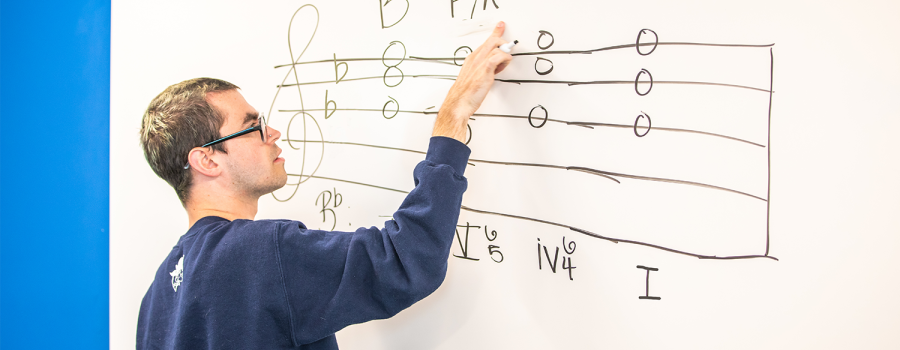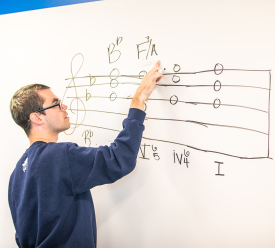Share your passion of music to tomorrow's great musicians!
Music inspires, enriches, and elevates our lives. It is an essential part of our culture, and the music education field exists to ensure this passion is passed on to the next generation. Share your love of music with today’s youth – and watch as it changes their lives for the better! A degree in music education provides the perfect foundation for a fulfilling career and future. From classical music to modern, you’ll be challenged with learning theory and technique as you work with faculty members who are accomplished musicians. You will graduate with the certification you need to become a licensed music teacher and leave your mark on the next generation of young musicians!
Programs & Requirements
* The credit hours listed on this page only reference the specific program requirements and is not reflective of the total hours necessary to receive your degree. Cumberlands requires all students obtain a minimum of 60 hours for an associate’s degree and a total of 120 hours for a bachelor’s degree. Transfer and prior learning credits may be counted toward those totals.
To learn more about our General Education Requirements, please visit the page referenced below or explore our Academic Catalog.
Bachelor of Music Education
In this program, you'll study the theory and craft of music and learn about great musicians of the past and present. You’ll also get hands-on experience with the craft, working with our experienced professors to develop your own musical talent. Over the course of your degree program, you’ll combine music courses with education courses that will give you the tools you need to effectively shape young people's understanding and appreciation of music, pinpoint their musical strengths, and coach them to a higher skill level musically.
Course Requirements
** 42 Credit Hours in professional education
- Music Education majors should take MUED 130 as a substitution in professional education and/or general education requirements.
- Music majors must achieve a grade of “C” or higher in prerequisite courses.
- Transfer students may have the pattern of prerequisites altered at the discretion of the Department Chair.
- Voice majors must take MUPR 121 - Class Voice and Diction
- Piano majors will substitute MUPR 221 - Piano Pedagogy for MUPR 117 - Class Piano I and MUPR 118 - Class Piano II
- All Music Education majors: All candidates pursuing the Bachelor of Music degree in Music Education MUST be accepted into the Teacher Education program before they will be allowed to register for EDUC 432 - Fundamentals of Secondary Education or ELEM 430, Classroom Management and Behavior.
- MUPR 117 - Class Piano I
- MUPR 118 - Class Piano II
- MUSC 131 - Music Theory and Skills I
- MUSC 132 - Music Theory and Skills II
- MUSC 231 - Music Theory and Skills III
- MUSC 232 - Music Theory and Skills IV
- MUSC 312 - Basic Conducting
- MUSC 313 - Advanced Conducting
- MUED 324 - Teaching Music in the Elementary School
- MUSC 333 - Music History I
- MUSC 334 - Music History II
- MUSC 401 - World Music
- MUSC 422 - Arranging
- MUSC 423 - Form and Analysis
- MUSC 424 - Twentieth-Century Music
- MUED 425 - Music Core Seminar
- Choose 6 Credit Hours of Ensembles outlined in the Music Education (P-12), B.M. Emphasis Requirements
42 credit hours in professional education. View academic catalog for more information.
Music Performance Scholarships
Music Scholarships are available to students who plan to participate in music ensembles at UC. An audition is required to apply for a scholarship.

Take the Next Step
Program Mission
The mission of the Department of Music is to provide you with opportunities to grow in understanding of musical concepts, acquire musical skills, and develop aesthetic values, all in preparation for a successful career in music.
Music Education Careers & Outcomes
All stats from U.S. Bureau of Labor Statistics
Music Teacher: $53,260
Music Teacher: $53,260
As a music teacher, you’ll instruct students in public or private schools and provide musical education, teaching both performance and music theory. In addition, you may lead various ensembles, like choirs or marching bands. You’ll pass your knowledge of singing, playing various instruments, reading music, and understanding musical concepts and styles to the next generation of musicians.
Private Music Teacher: $57,532
Private Music Teacher: $57,532
As a private music teacher, you’ll teach the art of music to individuals or groups outside a school setting. Some private music teachers specialize in specific instruments or areas of music. Private music teachers offer a more individualized instructional environment where students can get feedback and further develop their musical talents.
Choir Director: $44,759
Choir Director: $44,759
As a choir director, you’ll be responsible for leading and directing a choir during performances and concerts as well as scheduling and organizing rehearsals, selecting musical pieces, and managing budgets.
Conductor: $43,581
Conductor: $43,581
Similar to a choir director, as a conductor, you’ll lead musicians in musical performances and concerts. You will develop an orchestra and direct individual musicians to make the performance as a whole come together while listening critically and directing the interpretation of the music. As a conductor, you could lead local orchestras or teach in a variety of different learning environments.
Music Minister: $30,071
Music Minister: $30,071
As a music minister in a church or place of worship, some of your responsibilities will include planning, directing and rehearsing church choirs, worship teams, and musicians. You’ll oversee pianists, guitarists, drummers and singers before and during services, as well as having the opportunity to teach, coach and mentor church members through music to develop their talents and spiritual lives.
Music Therapist: $51,839
Music Therapist: $51,839
As a music therapist, you’ll use musical theory and practice and apply them in a therapeutic setting, using a combination of songwriting, lyrics, imagery and conversation to assess the emotional and mental well-being of their patients. Through musical application, music therapists help patients learn, grow, heal, and further their treatment.
Choral Ensembles
Students can audition for these ensembles and earn performance scholarships as well as course credit.

Cumberland Voices
Cumberland Voices is our chamber choir (MUPR 111) including an auditioned ensemble of 14-16 singers.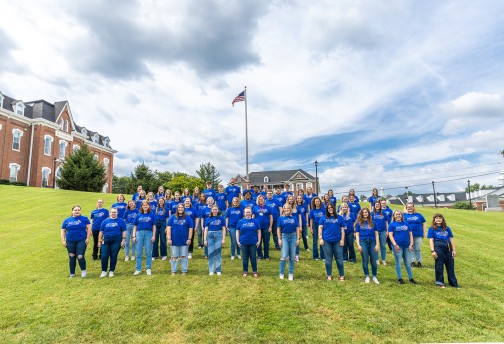
Chorale
Chorale (MUPR 110) is considered the primary large choral ensemble and is open to all students on campus.Bands
Students can audition for these ensembles and earn performance scholarships as well as course credit.

Marching Band
The Marching Band (MUPR 114) is the most visible part of the music program and is made up of students from all majors on campus.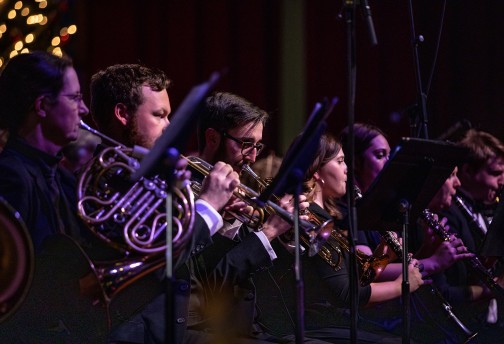
Concert Band
Concert Band (MUPR 115) performs concerts during the spring semester and is open to all students, faculty and community members.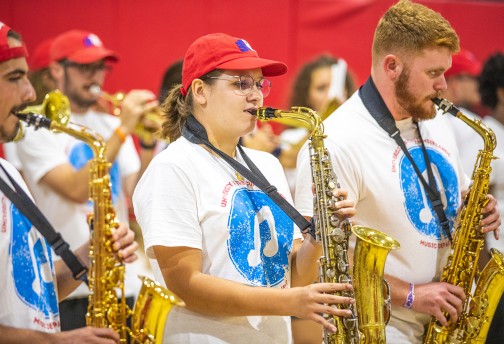
Pep Band
The Pep Band (MUPR 119) is the primary athletic band for the spring semester.Additional Ensembles
Students can audition for these ensembles and earn performance scholarships as well as course credit.

Percussion Ensemble
The Percussion Ensemble (MUPR 109) is designed to give the percussionist an intensive playing experience.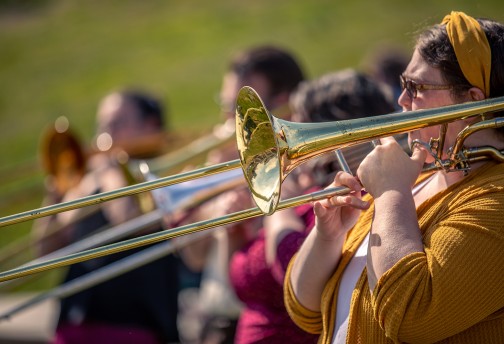
Jazz Ensemble
Jazz Ensemble (MUPR 116) performs music from a variety of styles including swing, funk, latin, ballads, bebop and fusion.
Chamber Ensembles
In addition to large ensembles, UC offers various smaller chamber ensembles for student participation.Common Questions
A music education degree is an undergraduate program that prepares students to teach music in schools and other educational settings. The program includes coursework in music theory, composition, and performance, along with training in teaching methods and classroom management. Graduates are equipped with the skills needed to instruct students in music, whether in public or private schools, or through private lessons.
A music education degree typically takes four years to complete when pursued as a full-time bachelor’s program. This timeframe includes completing general education requirements as well as specialized music education coursework, totaling 96 credit hours specific to the program.
A music education degree is generally not available entirely online due to the hands-on aspects of the program, such as performances, practice, and direct instruction. While some coursework may be offered online, many elements, including music lessons and ensemble participation, typically require on-campus attendance to ensure a complete learning experience.
A music education degree is worth it for those who wish to pursue a career in teaching music or working in related fields. It provides a solid foundation in music theory and pedagogy, prepares you for certification as a music teacher, and opens up career opportunities in various educational and musical settings.
With a music education degree, you can pursue various careers, including becoming a music teacher in public or private schools, a private music teacher, a choir director, a conductor, a music minister, or a music therapist. The degree also prepares you for roles that involve leading musical ensembles and developing music programs.
To obtain a music education degree, you need to enroll in an accredited program that offers a Bachelor of Music Education. The program will include coursework in music theory, pedagogy, performance, and general education. You’ll also need to meet specific program requirements and possibly pass performance or audition requirements.
While it is possible to teach music without a formal music education degree, having such a degree is highly beneficial and often required for certification and teaching positions. Without a degree, you might be limited to private teaching or informal settings, and you may lack the structured training in pedagogy and classroom management.
A music education degree focuses on preparing students to teach music, including learning pedagogical methods, classroom management, and educational theory. In contrast, a music performance degree emphasizes developing advanced skills in musical performance, including technique, repertoire, and stage presence. While both degrees involve music training, they prepare students for different career paths within the field of music.
Faculty Experts in Music
Learn more about the music professors you will interact with.

Dr. Tara Warfield

Dr. Duane Warfield
Dr. Duane Warfield
Contact Information
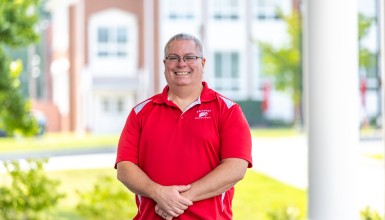
James R. Corcoran
James R. Corcoran
Contact Information
Request Information
If you have any questions, leave us a note below, and we'll get back to you soon.
